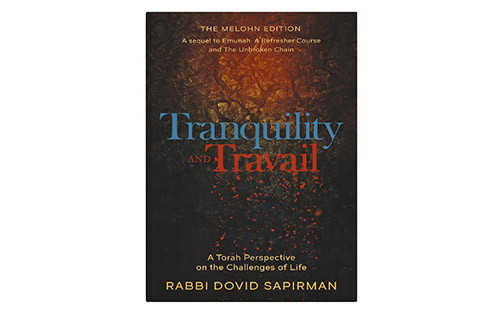
Excerpting: “Tranquility and Travail” by Rabbi Dovid Sapirman. Mosaica Press. 2021. English. ISBN-10: 1952370264.
The plain reality of life is that not all we experience is pleasureful. During their lives, most people get plenty of hard knocks. Some have it somewhat easier, others have it harder, but almost every person seems to get their portion of difficulties.
There are people who absolutely refuse to think about the possibility of sickness, poverty or the inevitability of death. Especially when life is going relatively well, they lull themselves into a pleasant daydream that everything will remain status quo forever. If upsets come along, as they so often do, such people often fall apart. They simply give way to despair, not knowing how to deal with their misfortune.
Hardships are all the more difficult to bear if we have no clear perspective on the purpose of life and the meaning of these travails. How much better it is to have this perspective before any hard times come—and how difficult it is to gain it once we are already in pain.
“Tranquility and Travail” imparts a positive perspective on these matters, as taught to us by our Torah, through Chazal, through the following spiritual concepts:
- The body is merely a garment for the neshamah, donned at birth and removed at the time of death. Death is actually the moment of yetziat haneshamah.
- This world is merely a temporary stopover on our journey to the ultimate destination, the afterlife. It is for that purpose that we were brought to this world in the first place.
- Life in this world is less than a fleeting moment compared to the eternal existence in Olam Haba (the World to Come).
- Whatever we undergo in this world has a direct effect on our portion in the afterlife.
- This world is not the world of reward for what we do. That is reserved for Olam Haba.
- There are specific reasons why good people sometimes suffer hardships and evil people prosper.
- The Creator’s intelligence is infinite and human intelligence is very limited. Therefore, in all matters that are beyond our understanding, we can rely on His judgment because it is always correct.
- Even the malachim (angels), and certainly humans, are not able to discern a consistent pattern in the way Hashem deals with individuals. Although we have been taught some general rules, we don’t understand precisely when they apply or when they don’t.
- We never pass judgments on what the Creator does. He doesn’t need our approval and it is folly to attempt to judge Him and what He does. A true maamin (believer) knows that although it can help when we have some understanding of the ways of Divine providence, we fully accept His judgment even when we don’t.
- Whatever happens to a person, no matter how unpleasant or painful, is ultimately for a good purpose whether we understand its purpose or not.
- Chazal have taught us many reasons why a person might have to undergo difficulties. We will try to transmit some of their teachings on this subject.
- We never ask for yissurim (suffering); on the contrary, we ask Hashem not to give them to us. Nevertheless, if they do come (as unwanted as they are), we need to realize that they serve an important purpose. Though not always easy, we should even try to be thankful for them.
- Hashem loves us, whether we are living through a pleasant period or a rough one. Yissurim are absolutely not an indication of rejection by Hashem.
- Hashem deals with us as individuals, but also collectively, as a community. Things that are decreed upon a community may affect all the individuals in that community.
- The patterns of history need to be studied if we are to have any understanding of how Hashem runs His world, and more specifically, how He guides His (Jewish) people. These patterns seem to be very consistent.
Through understanding the workings of the world we can prepare ourselves for the inevitable difficulties that life brings and can grow closer to Hashem.
By Rabbi Dovid Sapirman











